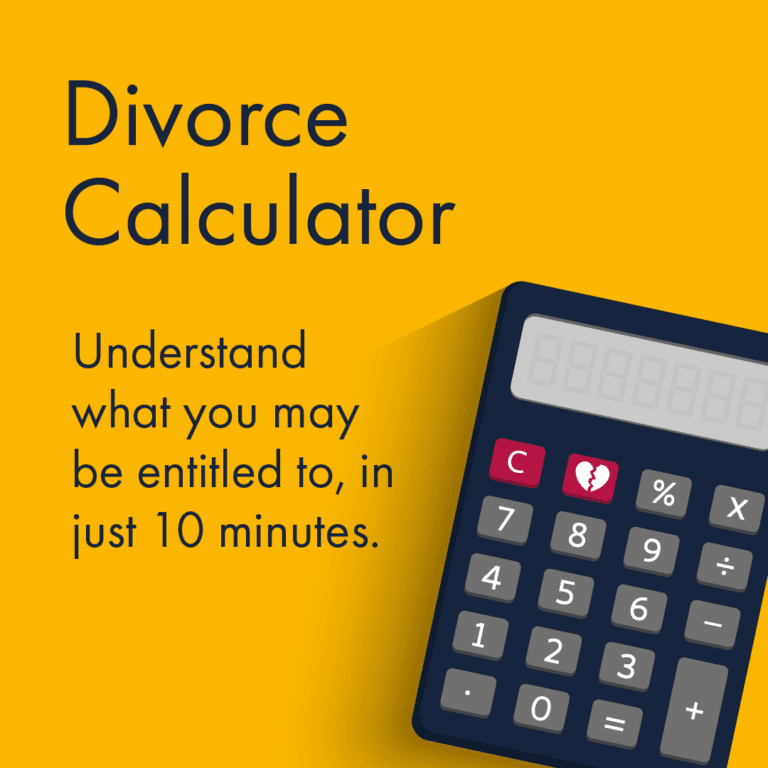 Download our guide to divorce
Download our guide to divorce
What is a prenup?
A prenuptial agreement (‘prenup’ for short) is a legal contract signed by a couple before they get married or enter a civil partnership.
It sets out the ownership of their respective assets and how they will be divided in the event of a divorce or separation. Prenups can cover property, savings, investments, debts and even future inheritances.
A prenup’s purpose is to provide clarity and protect individual interests, making financial arrangements more straightforward should the marriage break down.
 Use the calculator
Use the calculator
How does a prenup work?
A prenuptial agreement must be fair and entered into freely, without pressure or coercion. Once drafted and signed, the prenup serves as a reference point for financial matters.
If you’re looking to put a prenup together, it should generally run along these lines.
- Full disclosure: Both partners share all their assets (like property, investments and savings) and debts (such as loans and mortgages). At this stage, it’s important to be fully transparent about all your assets, otherwise they will not be subjected to the prenup’s terms.
- Negotiation: The couple discusses how they want to manage finances during the marriage and divide assets if they divorce, including topics like financial spousal support and how properties will be divided.
- Legal counsel: Each person gets advice from their own lawyer to ensure they understand the agreement and their rights are protected.
- Drafting: A lawyer writes the prenup, clearly outlining the terms that have been agreed upon.
- Signing: Both partners willingly sign the document. This must be done at least 28 days before the wedding or civil partnership.
- Review: The prenup can be updated over time, especially after major life changes like having children or significant shifts in income.
Are prenups legal in the UK?
Prenuptial agreements are not strictly legally binding in the UK but they are given significant weight by courts. Judges will consider a prenup during divorce proceedings, especially if it meets the criteria outlined above.
Courts have been more likely to uphold prenups since the landmark Radmacher v Granatino case in 2010.
-
Prenup example: Radmacher v Granatino
Radmacher v Granatino significantly impacted how prenups are viewed in the UK.
Although they had previously been viewed with scepticism, the Supreme Court held that prenups should be given “decisive weight” if freely entered into by both parties with full understanding and legal advice.
In this case, a wealthy German heiress and a French investment banker had a prenup where he waived rights to her assets. When they divorced after eight years of marriage, he made a claim of more than £5.5 million against her, which was originally upheld. However, the Supreme Court sided with the wife, significantly strengthening the enforceability of prenups in England and Wales thereafter.
-
What cannot be included in a prenup in the UK?
While prenups can cover a lot, there are some things they can’t include.
- Decisions about children. Outcomes about child custody or child support can’t be in a prenup. The court always puts children’s best interests first.
- Unfair or illegal material. If something in the prenup encourages divorce or is against the law, a court will likely ignore it.
- Trying to avoid paying what’s fair. You can’t use a prenup to completely avoid paying spousal support or to make your ex-partner struggle financially.
 Download our Form E guide
Download our Form E guide
Can you get a prenup after marriage?
Yes, this is called a postnuptial agreement. It works in largely the same way as a prenup, with assets and other financial factors divided up between spouses in case of divorce.
A ‘postnup’ can help if your circumstances change after you are married. Having children might prompt you to formalise an agreement. Just like prenups, postnuptial agreements are not legally binding in the UK. However, a professionally drafted agreement that meets the same standards outlined for prenups will be given serious consideration by the court in the event of a separation.
The landmark case for postnuptial agreements in the UK is MacLeod vs MacLeod (2008). The case focused on the validity of an amendment made to a prenuptial agreement before the couple – both American citizens – had married eight years prior. The case predates Radmacher v Granatino, so postnups have actually been recognised in the UK for longer than prenups.
Does a prenuptial agreement expire?
Most prenuptial agreements do not have an automatic expiration date and are signed to run until put before the courts or until one person dies.
However, a prenup can include provisions for review or termination after certain events, such as the birth of a child or after a specified number of years.
Regularly reviewing and updating the agreement is advised – especially after circumstances change for the family or either side – to ensure it remains fair and relevant to both parties.
Can you write your own prenup?
A solicitor can ensure the agreement is reasonable and meets all legal requirements and that both parties fully understand the terms. This increases the likelihood that the prenup will be considered valid by the courts. DIY prenups may lack essential elements, leading to disputes or the agreement being disregarded.
Nuptial agreements are increasingly common and no longer the preserve of celebrities and the super wealthy. They are particularly useful where one spouse has received or is likely to receive significant family gifts or inheritance, or where one of the couple is bringing assets into the marriage, perhaps those that they wish to pass on to their children in the future.
Prenup pros and cons
Our family law experts can help you apply the advantages and disadvantages to you and your partner’s circumstances.
Prenup pros and cons
Our family law experts can help you apply the advantages and disadvantages to you and your partner’s circumstances.
-
Pros
- Asset and debt protection: A prenup safeguards personal assets acquired before marriage, including inheritance or family businesses. You’ll also be shielded from debts incurred by your partner before the marriage.
- Clarity and certainty: Provides a clear plan for how assets will be divided in the event of divorce, reducing potential conflicts.
- Saves time and money: Can simplify divorce proceedings, potentially reducing legal costs.
- Financial planning: Encourages open discussions about finances before marriage.
-
Cons
- Emotional difficulty: Discussing a prenup can be uncomfortable and may imply a lack of trust. A properly drafted prenup will require some full and frank discussions about your current individual circumstances.
- Not fully binding: Courts may override the agreement if it is deemed unfair or if circumstances have significantly changed since it was signed.
- Cost: Legal fees for drafting a prenup can be expensive.
- False security: Relying on a prenup might give a false sense of security if it’s not upheld in court.

How do I get a prenup?
Creating a prenuptial agreement that’s right for you and your partner requires careful planning and legal expertise.
We can help ensure your prenup is fair, comprehensive and likely to be upheld. We have offices across the UK and our support team is available seven days a week.
Ready to start the conversation? Contact us today for a confidential consultation with our experienced family law solicitors.
Newsletter Sign Up
Sign up for advice on divorce and relationships from our lawyers, divorce coaches and relationship experts.
Privacy Policy